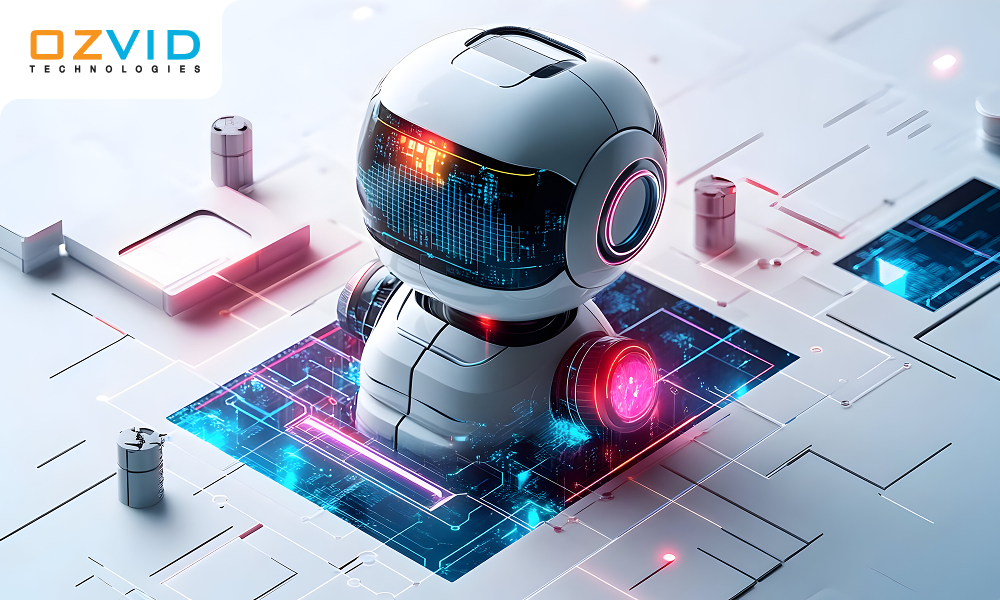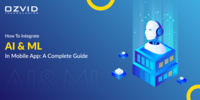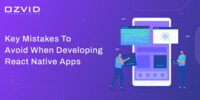- Dec 30, 2025
Share this post on:

Artificial Intelligence (AI) is no longer a futuristic concept but a powerful, practical force reshaping industries and business models in 2026. For enterprises seeking to maintain or elevate their competitive edge, the integration of AI services into existing operations has become a strategic imperative. This blog explores how AI integration services drive competitive advantage by accelerating innovation, optimizing operations, enhancing customer experiences, and enabling smarter decision-making.
Key Takeaways
AI integration is essential for competitive advantage in 2026.
Automating tasks and leveraging data boosts efficiency and decision-making.
Custom AI solutions enhance customer experience and drive innovation.
Security, compliance, and ethical AI practices protect data and build trust.
Partnering with experts like OZVID Technologies ensures seamless adoption and measurable business growth.
Understanding AI Integration Services
AI integration services refer to the expertise and technology that enable businesses to embed AI capabilities seamlessly into their existing software systems, workflows, and processes. These services combine AI models, such as machine learning, natural language processing, and automation, with enterprise platforms like CRMs, ERPs, cloud environments, and data lakes. The goal is to transform siloed applications into intelligent, responsive ecosystems that deliver real-time insights and automation.
The Competitive Landscape in 2026
By 2026, AI adoption will have moved beyond experimental pilots to extensive operational use. Enterprises globally recognize AI integration as foundational to digital transformation and growth. Industry data projects that around 40% of enterprise applications will have task-specific AI agents embedded, a dramatic increase from under 5% in 2025. This rapid integration defines the difference between organizations that achieve breakthrough performance gains and those that fall behind.
Reasons to Invest in AI Integration Services in 2026
Artificial Intelligence (AI) has become a cornerstone of modern business strategy, and integrating AI services into existing systems is crucial for companies aiming to thrive in 2026. Investing in AI integration services enables organizations to harness advanced technologies such as machine learning, natural language processing, and automation to transform operations, improve customer interactions, and unlock new avenues for growth.
Drive Operational Efficiency
AI integration services automate repetitive and time-consuming tasks, ranging from data entry to customer query handling and supply chain optimization. Automating these processes reduces human errors, speeds up workflows, and frees employees to focus on strategic activities that enhance innovation and productivity. Studies indicate that by 2026, up to 70% of routine work in many businesses could be automated through AI, leading to significant cost savings and operational excellence.
Custom AI Capabilities
While off-the-shelf AI tools offer value, custom AI integration services allow companies to tailor solutions specifically to their unique business requirements. Whether it’s embedding AI-powered chatbots in customer service systems, implementing predictive analytics for inventory management, or deploying generative AI for personalized marketing content, integration ensures smooth, scalable, and extensible AI adoption aligned with strategic goals.
Enhance Customer Experience
AI integration enhances customer interactions by delivering faster, more personalized, and context-aware services. AI chatbots provide 24/7 instant support, product recommendations adjust dynamically to customer preferences, and predictive analytics anticipate customer needs before they arise. Enhanced customer journeys foster loyalty, boost satisfaction, and provide a competitive edge in saturated markets.
Data-Driven Decision Making
Integrating AI into enterprise software connects vast, diverse datasets and applies machine learning algorithms to generate actionable insights. These insights support smarter decisions in real-time—from demand forecasting and risk assessment to resource allocation and quality control. Businesses equipped to leverage AI-driven analytics see improved agility and reduced uncertainty, which is increasingly crucial in fast-moving industries.
Accelerate Innovation
AI integration services empower businesses to experiment with emerging technologies like autonomous AI agents, synthetic content generation, and hyper-automation. Early adopters benefit from differentiating themselves as innovation leaders and securing market share. Moreover, AI integration facilitates rapid scaling of new ideas without extensive infrastructure overhaul, shortening time to value from AI initiatives.
Improve Scalability and Flexibility
Well-integrated AI solutions enhance the scalability and adaptability of business processes. Cloud-based AI models and hybrid deployment architectures allow companies to adjust AI workloads dynamically based on business demands. This flexibility is vital for managing seasonal spikes, evolving customer preferences, and continuous improvement of AI models through ongoing retraining and tuning.
Strengthen Security and Privacy
AI integration services embed compliance frameworks and security protocols into AI systems from the ground up. This includes GDPR adherence, data encryption, audit trails, and AI explainability features that build trust with customers and regulators. Proactively addressing security and ethical AI considerations reduces risk and supports sustainable AI adoption.
Open New Revenue
Generative AI and other advanced AI capabilities enable businesses to create innovative products and services that were previously impossible or cost-prohibitive. Examples include AI-driven personalized content, dynamic pricing strategies, and automated financial advisory services. These new offerings not only increase revenue potential but also enhance customer engagement and brand reputation.
Key Ways AI Integration Services Drive Competitive Advantage
Enhanced Operational Efficiency
AI automates repetitive, low-value tasks such as data entry, customer inquiries, and inventory management. Integration services enable these automations to fit smoothly into workflows, reducing manual errors and accelerating processes. For example, AI-powered virtual assistants can manage schedules and prioritize daily tasks, helping employees focus on higher-impact activities. According to management consulting studies, AI can automate work activities consuming 60-70% of employees' time, unlocking substantial productivity gains.
Data-Driven Decision-Making
One of AI’s most transformative impacts is its ability to analyze massive datasets to uncover patterns and predict outcomes beyond human capability. AI integration services help organizations embed predictive analytics and intelligent insights into operational dashboards and enterprise apps, empowering leaders to make faster, more strategic decisions with reduced risk. Companies like Shell and IBM use AI-driven analytics to optimize resource allocation and treatment options, respectively, showcasing AI's diverse decision-support benefits.
Cost Optimization
AI-driven automation reduces operational costs by minimizing manual labor, preventing errors, and optimizing asset utilization through predictive maintenance. Energy consumption can also be optimized by AI analyzing usage patterns, driving both cost savings and sustainability. Integration services ensure AI-driven optimizations are tightly connected with legacy infrastructure and supply chains, maximizing ROI.
Superior Customer Experience
By integrating AI into customer-facing systems, businesses offer personalized, rapid, and proactive service that meets rising customer expectations. AI-powered chatbots, recommendation engines, and personalization algorithms become part of core customer relationship management, allowing deeper engagement and loyalty. Early AI adopters see measurable increases in customer satisfaction and retention, key competitive differentiators in crowded markets.
Agility and Innovation Enablement
AI integration services simplify embedding AI innovations rapidly and at scale, supporting agile business models. Organizations can implement AI enhancements without overhauling existing systems, enabling quicker response to market changes and emerging opportunities. Leading AI integration platforms offer pre-built connectors and templates that accelerate deployment, allowing firms to focus on innovation rather than technical complexities.
Risk Management and Compliance
With rising regulatory scrutiny around AI and data privacy, integration services also ensure that AI solutions are compliant with regional regulations and security best practices. This builds trust with customers and stakeholders while reducing the risk of costly legal and reputational issues. Embedded monitoring and governance frameworks become a seamless part of the AI ecosystem.
Talent Enablement
Integrated AI acts as a force multiplier for employees, lowering skill barriers by automating routine tasks and amplifying human expertise. Intelligent augmentation makes complex tasks more accessible, enabling more people to contribute effectively across roles and languages. Companies that invest in integrated AI tools gain a more engaged, skilled workforce that drives competitive advantage.
AI Integration Services Cost in 2026
Here is a detailed table outlining the cost breakdown for AI integration services in 2026 based on common project types, feature sets, deployment models, and talent acquisition, compiled from recent industry data:
Cost Component | Description | Typical Cost Range (USD) | Notes |
|---|---|---|---|
Basic AI Integration | Simple AI features like chatbots, predictive dashboards | $10,000 – $30,000 | For small projects with limited customization and prebuilt APIs |
Mid-Level AI Integration | NLP-driven support, recommendation engines, custom pipelines | $30,000 – $70,000 | Integrating AI across multiple apps with moderate complexity |
Enterprise Integration | Large-scale deployments across ERP, CRM, data warehouses | $70,000 – $100,000+ | Heavy data prep, legacy system integration, and ongoing support |
Feature-Based Cost:
Feature | Description | Typical Cost Range (USD) | Notes |
|---|---|---|---|
Basic Automation | Simple bots and workflow triggers | $5,000 – $15,000 | Workflow automation to reduce manual tasks |
Predictive Analytics & Dashboards | Forecasting, churn prediction, KPI tracking | $10,000 – $25,000 | Embedding AI insights in operational dashboards |
Recommendation Engines | Personalized product/content suggestions | $15,000 – $30,000 | Used in e-commerce and marketing personalization |
Natural Language Processing | Chatbots, virtual assistants, text analytics | $20,000 – $40,000 | Customer support automation and conversational AI |
Computer Vision | Image recognition, defect detection | $25,000 – $50,000 | Used in manufacturing, surveillance, and healthcare |
Speech Recognition & Voice | Voice assistants, call center automation | $20,000 – $45,000 | Automated customer interaction via voice |
Generative AI | Text, image, code generation | $30,000 – $60,000 | Advanced content creation automation |
AI Agents | Autonomous assistants for complex workflows | $35,000 – $70,000 | Multi-step agent workflows in enterprise contexts |
Deployment Models:
Deployment Model | Description | Typical Cost Range (USD) | Notes |
|---|---|---|---|
Cloud-Based AI Deployment | Scalable cloud infrastructure with pay-as-you-go pricing | $8,000 – $25,000 | Low upfront hardware cost, scalable with usage |
Hybrid Deployment | Combination of cloud and on-premises control | $20,000 – $45,000 | Balances security and scalability |
On-Premises / Edge Systems | Local deployment for security and low latency | $30,000 – $70,000 | High security and performance demand |
AI as a Service (AIaaS) | Subscription-based AI models with minimal setup | $5,000 – $15,000 + monthly fees | Lower up-front cost, pay-as-you-use model |
Talent & Vendor Cost:
Talent/Vendor | Description | Typical Cost Range (USD) | Notes |
|---|---|---|---|
In-house AI Team | Full-time engineers and data scientists | $120,000 – $180,000 per developer annually | For long-term strategic AI adoption |
Outsourcing / Freelancers | Hourly or project-based AI expertise | $10,000 – $40,000 per project | Flexible but variable quality |
Specialized AI Vendors | End-to-end AI integration solutions | $30,000 – $80,000 per project | Quicker deployment with domain expertise |
Dedicated Hires | Contracted specialists through hiring services | $8,000 – $20,000 per month per developer | Mid-term or long-term engagements |
Project Management & Architecture | Oversight to manage scope, budget, and timelines | $5,000 – $20,000 per project | Ensures on-time and on-budget delivery |
UI/UX Design Adjustments | Interface redesign for AI adoption | $5,000 – $15,000 | Critical for user acceptance and ROI |
Maintenance & Scaling:
Maintenance Aspect | Description | Typical Cost Range (USD) | Notes |
|---|---|---|---|
Model Monitoring & Retraining | Keeps AI models accurate and relevant | $5,000 – $15,000 per model annually | Continuous improvement and adaptation |
Software & API Updates | Regular updates to maintain system stability and security | $3,000 – $12,000 annually | Essential for reliability and integration |
Cloud & Infrastructure Scaling | Increased GPU, storage, processing capacity | $8,000 – $25,000 annually | Scalability as data and usage grow |
MLOps Automation Upkeep | Automated training and deployment pipeline maintenance | $5,000 – $15,000 annually | Streamlines AI lifecycle management |
Security & Compliance | Adapting to privacy laws and securing AI systems | $4,000 – $18,000 annually | Critical for regulatory adherence and data protection |
Common Challenges in AI Integration
In 2026, integrating artificial intelligence (AI) into business operations is no longer optional but essential for competitiveness. However, AI integration is a complex journey that comes with a variety of challenges. Understanding these hurdles is crucial for organizations to plan effectively, mitigate risks, and unlock the full potential of AI technologies.
Legacy Systems Compatibility
One of the most persistent challenges in AI integration is the incompatibility of legacy IT systems that were never designed to support modern AI models, large volumes of data, or cloud-based computing needs. Many enterprises rely on outdated infrastructures that lack APIs or the scalability required for seamless AI embedding. Upgrading or replacing legacy systems, or creating middleware solutions and custom APIs, often requires significant time and investment. Without smooth integration, businesses face performance bottlenecks and fragmented AI deployment that limits effectiveness.
Data and Quality Issues
AI’s value depends heavily on high-quality, unified data sets. Unfortunately, many organizations suffer from data silos—where information is trapped within isolated departments or incompatible systems, leading to incomplete or inconsistent data availability. Moreover, data may be unstructured, incomplete, or inaccurate, severely impairing AI model training and generating biased or unreliable insights. Overcoming this requires investment in data management solutions like data lakes, data fabrics, and rigorous data cleaning and labeling processes to ensure AI readiness.
Security and Privacy Concerns
Integrating AI into core business operations raises significant concerns about data security, privacy, and regulatory compliance. AI systems require access to large amounts of sensitive data, increasing exposure to cyber threats such as adversarial attacks or data leakage. Additionally, regulatory frameworks for AI, such as GDPR in Europe or sector-specific requirements in healthcare and finance, are evolving rapidly and vary across jurisdictions. Businesses must establish strong governance, encryption, audit trails, and compliance monitoring embedded within AI workflows to mitigate legal and reputational risks.
Workforce Resistance
The demand for skilled AI professionals outpaces supply globally, resulting in a significant talent gap. Companies struggle to build capable teams of data scientists, ML engineers, AI architects, and integration specialists. Moreover, existing employees often resist AI adoption due to fear of job displacement, skill obsolescence, or lack of understanding. Successful AI integration requires not only hiring or partnering for necessary talent but also comprehensive workforce training, change management, and communication strategies to foster user acceptance and collaboration.
Scalability Challenges
AI solutions can perform well in pilot projects but struggle to maintain performance and scalability at enterprise scale. Challenges include model drift—where AI predictions degrade over time due to changing data patterns—and infrastructure limitations in computational power, storage, and network bandwidth. Fragmented AI tooling and vendor lock-in also complicate scaling efforts. Organizations need robust MLOps practices, scalable cloud or hybrid infrastructure, continuous model monitoring, and retraining mechanisms to ensure sustained AI impact.
ROI Measurement
AI integration projects often require considerable upfront investment in technology, talent, and process transformation. Yet, quantifying the return on investment (ROI) is not always straightforward. Traditional financial metrics may not capture broader benefits like quality improvements, innovation potential, or enhanced customer experience. This uncertainty makes it harder for organizations to justify budgets and maintain executive support. Developing comprehensive ROI frameworks that include productivity gains, risk reduction, and employee experience improvements is critical for securing ongoing investment.
Real-Time Processing
Many AI applications, such as chatbots, dynamic pricing, or personalized recommendations, require real-time or low-latency processing to be effective. However, integrating AI algorithms into existing systems often introduces network delays, bottlenecks, or synchronization issues, especially with legacy infrastructure. Addressing these latency challenges may involve upgrading networking components, adopting edge computing, containerization technologies like Kubernetes or Docker, and optimizing AI architectures for responsiveness.
Organizational Barriers
Finally, successful AI integration is not merely a technical endeavor but also a cultural transformation. Siloed organizational structures, misaligned incentives, or a lack of collaboration between IT, data science, and business units slow AI progress. Resistance to change, fear of AI replacing human jobs, and ethical concerns also impact adoption. Organizations must foster a culture of innovation, cross-functional teamwork, and transparent communication around AI’s role and benefits to build trust and engagement.
Conclusion
At OZVID Technologies, we believe AI integration services are the cornerstone of sustainable competitive advantage in 2026 and beyond. Our expertise in seamlessly embedding AI capabilities into enterprise ecosystems empowers organizations to unlock unmatched efficiency, innovation, and customer satisfaction. By partnering with OZVID Technologies, businesses transform AI from a theoretical advantage into tangible, scalable performance gains that drive growth and market leadership.
Frequently Asked Questions
What are AI integration services?
AI integration services refer to specialized solutions and expertise that help businesses embed artificial intelligence technologies into their existing software systems, applications, and workflows. These services encompass anything from machine learning model deployment to natural language processing and intelligent automation.
How do AI integration services improve business efficiency?
AI integration services improve efficiency by automating repetitive, time-consuming, and error-prone tasks that traditionally relied on human labor. Examples include data entry, transaction processing, responding to frequently asked customer queries, managing schedules, and inventory tracking.
Why is AI integration important for competitive advantage?
In today’s fast-evolving market, competitive advantage hinges on a company’s ability to innovate, operate efficiently, and deliver superior customer experiences. AI integration enables all of these by embedding intelligent automation, predictive analytics, and personalization capabilities directly into business systems.
How do AI integration services ensure data privacy and compliance?
Data privacy and regulatory compliance are critical considerations in AI deployment. AI integration services include designing and implementing robust governance frameworks that ensure AI models handle data according to regional data protection laws like GDPR or HIPAA. This involves secure data storage, encryption, regular audits, and access control policies integrated within AI workflows.
Can small businesses benefit from AI integration services?
Absolutely. While large enterprises often lead in AI adoption, small and medium-sized businesses (SMBs) stand to gain significantly from targeted AI integration. Many service providers now offer scalable, affordable AI solutions that address SMB needs, such as automated customer support chatbots, personalized marketing engines, inventory management, and expense tracking.










